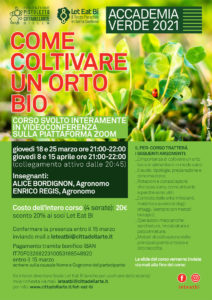Farming an organic garden, knowing the different types of ground, finding out about rotations and consociations, curbing weeds, preventing vegetable diseases in a sustainable way and conducting mechanical operations (hoeing, earthing up and mulching): these are, in synthesis, the key topics of Let Eat Bi’s new course, which will be run entirely online in video conference. The initiative, called How to farm an organic garden, curated by agronomists Alice Bordignon and Enrico Regis, will be hosted on the Zoom platform on four Thursday evenings (18th and 25th March, 8th and 15th April) from 9.00 to 10.00 pm. Alice lives in Santhià but she is originally from the Biellese area, she provides training and assistance to fruit and vegetable farms, besides teaching at a first-level secondary school; Enrico, also from the Vercelli province and first-level secondary school teacher, specialises in the processes of stability of plants, landscape architecture and evaluations. “We are proposing this course in March and April,” said Alice, “because it is the best time to get the garden ready for farming. The initiative is dedicated to beginners, amateur farmers and people who already have basic notions but want to know more on the subject”. Let Eat Bi and the agronomists had to review the mode of participation in the course due to Covid-19 restrictions, but moving it onto an online platform will allow them to reach a wider geographical area, with participants from outside the Biella and Vercelli areas. “It is going to be a new type of approach for me,” added Alice, “since in the past years I have always organised fruit and vegetable farming days at the time of the autumn pruning of the plants, alternating practical and theoretical sessions, always in presence”.

Then the agronomist talked about the approach of the course, which will have many affinities with the principles embodied by Let Eat Bi: “The activity we will propose is built on the philosophy of organic farming, and we will emphasise the importance of eating and farming organic food. In addition to our suggestions, we will be available to help the participants with their specific needs”. Alice also gave us an excerpt from the part of the course about different farming methods: “The conventional method uses chemical fertilisers, insecticides and fungicides; integrated farming uses chemicals only when necessary; whereas organic farming uses only fertilisers, insecticides and fungicides of vegetable or animal origins”. Through the course, the organisers also want to inspire the participants to farm their own garden, bringing them closer to nature and to sustainable agriculture. Not only that: “In this period of pandemic,” she concluded, “it will be interesting to spend a few evenings doing something different, exchanging views on positive topics, linked to nature and rebirth. The initiative might end up contributing to the emotional wellness of the people involved”.

